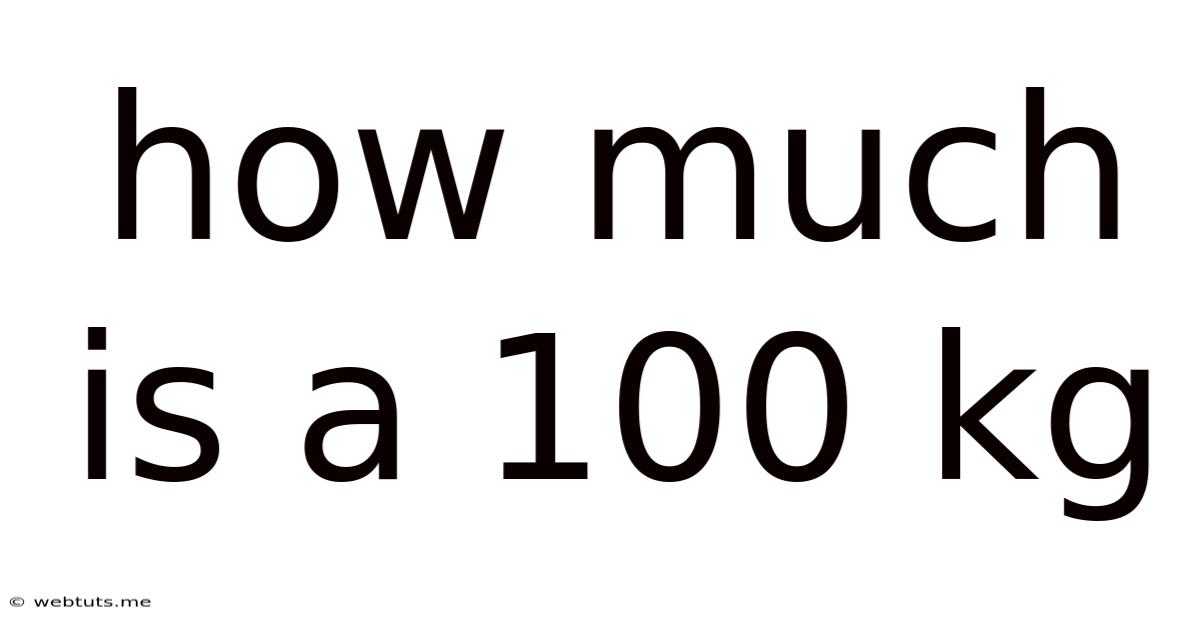How Much Is A 100 Kg
Webtuts
May 13, 2025 · 4 min read

Table of Contents
How Much Does 100 kg Weigh? Understanding Weight, Mass, and Units
The question "How much is 100 kg?" seems deceptively simple. However, the answer depends on what you mean by "much." Are you asking about the mass, the weight, the volume, or the cost of something that weighs 100 kilograms? Let's delve into the nuances of this seemingly straightforward question.
Understanding the Difference Between Mass and Weight
Before we can answer how "much" 100 kg is, we need to clarify the difference between mass and weight. This is a crucial distinction, often misunderstood.
-
Mass: This is the amount of matter in an object. It remains constant regardless of location. A 100 kg mass on Earth has the same mass on the moon. The SI unit for mass is the kilogram (kg).
-
Weight: This is the force of gravity acting on an object's mass. Weight changes depending on the gravitational field. An object with a mass of 100 kg weighs more on Earth than on the moon because Earth's gravitational pull is stronger. The SI unit for weight is the newton (N).
Therefore, 100 kg refers to mass. To determine the weight, we need to know the gravitational acceleration (g). On Earth, g is approximately 9.81 m/s². Thus, the weight of a 100 kg mass on Earth is:
Weight = Mass × Gravitational acceleration = 100 kg × 9.81 m/s² ≈ 981 N
100 kg in Different Units
Expressing 100 kg in different units helps visualize its magnitude:
-
Pounds (lbs): 100 kg is approximately 220.46 lbs (1 kg ≈ 2.2046 lbs). This conversion is useful for understanding the weight in a system commonly used in the United States.
-
Grams (g): 100 kg is equal to 100,000 g (1 kg = 1000 g). This is a smaller unit, useful for smaller quantities.
-
Metric Tons (t): 100 kg is equal to 0.1 metric tons (1 t = 1000 kg). This unit is convenient for larger quantities of materials.
-
Other Units: 100 kg can also be converted to other units like stones, ounces, or even tonnes (another spelling of metric tons). The choice of unit depends on the context and the desired level of precision.
Visualizing 100 kg: What Does it Look Like?
Imagining 100 kg can be challenging. Here are some relatable examples:
-
An average adult: Many adults weigh around 70-80 kg. Therefore, 100 kg is roughly equivalent to the weight of one and a half average adults.
-
A large bag of rice: A standard 50 kg bag of rice is readily available in many parts of the world. 100 kg would be two of these bags.
-
A small motorcycle: Depending on the model, a small motorcycle might weigh close to 100 kg.
-
A large dog: Some very large dog breeds can weigh close to 100 kg, although this is on the heavier side.
-
A stack of books: A substantial stack of books could easily weigh 100kg.
By comparing 100 kg to these everyday objects, we can gain a better understanding of its scale and magnitude.
The Cost of 100 kg: A Highly Variable Factor
The cost of 100 kg depends entirely on what you are weighing. The price can vary drastically:
-
Precious metals (e.g., gold, platinum): 100 kg of gold or platinum would be extremely expensive, costing millions of dollars.
-
Industrial materials (e.g., steel, cement): The cost would be significantly lower than precious metals, depending on market prices and the type of material.
-
Agricultural products (e.g., grains, fruits): The cost varies greatly depending on the season, location, and demand.
-
Other Goods: The cost of 100kg of anything depends entirely on that item. 100kg of feathers is cheaper than 100kg of diamonds!
To accurately determine the cost, you must specify the material or item being weighed.
Conclusion: The Importance of Context
The question "How much is 100 kg?" requires more context for a complete answer. It's essential to distinguish between mass and weight, use appropriate units based on the context, and, if referring to cost, specify the item. 100kg is a significant mass, approximately the weight of an adult and a half, or two large bags of rice. Understanding the implications of this weight in different contexts is crucial for accurate calculations and comparisons. Remember always to clarify your units and consider what aspects of 'how much' you are actually trying to assess. The cost can fluctuate dramatically, from the exorbitant price of 100kg of gold to the affordable cost of 100kg of sand. Always consider the specific item for accurate evaluation. Ultimately, understanding the multifaceted nature of this seemingly simple question enhances our understanding of measurement and its practical applications.
Latest Posts
Latest Posts
-
120 Days From June 24 2024
May 13, 2025
-
How Many Grams Sugar In 1 Teaspoon
May 13, 2025
-
How Many More Days Till December 21st
May 13, 2025
-
1 Day 12 Hours From Now
May 13, 2025
-
What Month Is 9 Months Before April
May 13, 2025
Related Post
Thank you for visiting our website which covers about How Much Is A 100 Kg . We hope the information provided has been useful to you. Feel free to contact us if you have any questions or need further assistance. See you next time and don't miss to bookmark.